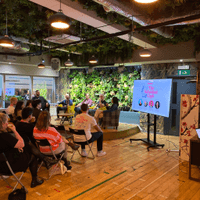The future of recruitment – personalised hiring in an AI age

Read our top takeaways from our latest Breakfast Club on the future of recruitment and personalised hiring with AI.

Seb Waterfield
As UK Marketing Manager at Teamtailor, I have a particular interest in creating content around work culture and diversity and inclusion.
According to LinkedIn, 64% of recruiting leaders predict that the future of recruitment will be more favourable to candidates and employees, as opposed to employers, over the next five years.
In our latest edition of The Breakfast Club, we sat down with Sam Franklin (Co-Founder and CEO at Otta), Gareth Jones (Chief Product Officer at Thomas), Louis Cross (Co-Founder at Canda) and Mae Yip (Co-Founder at ERIC) to discuss the impact of AI on recruitment and the steps companies can take to cater for the next generation. Here are our top takeaways from the discussion:
Analyse your AI tools thoroughly to weigh up the human vs tech balance
We’re all aware of the various advantages AI offers, but it’s still important to do your homework when it comes to the tools you leverage, and realise when and where human touch is still adding value.
Job posting for instance has divided many. The clear benefit to this is the time saved by creating posts for numerous roles in quick succession, particularly for the larger organisations that typically have more roles to advertise. On the other hand, these still need to be produced in a nuanced and personal way, and vary with tone depending on who you are targeting in order to avoid turning away job seekers who will be able to suss out clearly automated language. No matter how much time you save with the quantity of job posting, you do not want this to be at the detriment of your quality of job post, so it’s key to weigh this all up. Remember that AI is there to assist you with streamlining your recruitment, rather than take over your job completely. Take Co-pilot for example, which helps with summarising resumes, job ads and enhancing the overall candidate experience.
Similarly, we know that candidates will always desire a personal experience in the application process, some of which comes in the form of providing tailored and authentic feedback to the candidate. ‘Soft’ social skills such as intuition and empathy that only a human can provide are therefore still necessary in such areas. Other areas of the application process however can benefit hugely from AI, such as reducing bias during the screening process with anonymous mode. If you know you’re able to reduce bias and establish fairer hiring practices using AI, then leveraging it in this case is a no brainer.
Focus on hiring accuracy
As mentioned briefly in the previous section, screening has been an issue that has been grappled with by many recruiters, particularly within the bigger organisations that typically receive a larger volume of applications. On the flip side, numerous candidates are spending hours applying for roles and naturally want to speed up the process with the use of AI tools such as ChatGPT. In turn, this has resulted in increased difficulties for employers who are filtering through a greater volume of very similar applications, making it tricky to see who really wants to work for the company vs the ones that don’t.
So how do we bridge the gap between candidates and employers and put the power back in the individual’s hands? Again, this boils down to how you use the tech. Employers should focus on hiring accuracy to understand what each of their roles is really about and who the individual is that they’re looking for. One way to do this is to measure your candidates against success criteria for the role, whilst comparing them to the company’s blueprint and values. At the same time, applicants need to think about the DNA of a role and whether it’s really suitable. Even if ChatGPT is adopted to get your foot in the door, it only gets the candidate so far in the application process. More education therefore needs to be provided to the next generation around thinking before applying to a role and to highlight the desirable aspects of a job such as belonging and an inclusive work culture.
Understand the needs of the next generation
Hiring teams are often feeling conflicted when it comes to next gen plans, but more often than not, it boils down to employers failing to understand the needs of young candidates. Not only this, young people generally have no idea about what industries or roles currently exist, giving cause for concern over how much information they are exposed to.
The future of recruitment relies heavily on employers becoming the educators themselves and getting involved much earlier on in young people’s careers, whether that is giving talks at schools or providing more early careers initiatives such as training schemes and bootcamps. We are now seeing many employers scrap the traditional internships because the skills required for jobs are so different now.
In terms of the workplace, employers need to understand the work environment they are intending to generate and what types of people work best within that. Gen Z and Gen Alpha are both part of the social revolution, where having a job is not for survival, or necessarily to acquire tangible goals such as a flashy car or house. They’re predominantly searching for a quality of life, a strong sense of belonging and an overall feeling of happiness in their roles. We mentioned the disconnect between the young generation and employers but companies must also look to align leadership and management, with the latter exposed to what’s happening on the ground. Many companies, particularly in the tech industry, have appeared as the typical disruptors in the last few years, introducing forward-thinking policies such as four-day weeks and nine-day fortnights in order to attract the best talent.
Whatever strategy you adopt, ensure you’ve done your research on your candidate persona and ensure it reflects your values and culture. Are you introducing a policy because it benefits your leadership team or will it enable you to attract the next generation of talent?
Leverage AI to dictate your culture
Workplace culture is always top of mind with employers. Statistics such as employee productivity and satisfaction levels can be used as a benchmark when deciding to leverage AI. Will the tech you’re looking to implement help to improve these numbers and add value to your work environment?
One strategy to influence your culture is using AI to understand the capabilities of their employees and deconstruct job roles. This is likely to create more job fluidity, understand candidates’ skills better and empower them to take on and grow in different roles. Most employers typically have this pressure to source talent externally, but often it’s more beneficial and cost effective in the long term to leverage talent internally and nurture your existing talent pool. Given the significant shift to skills-based hiring, whether it’s hard or soft skills, this strategy should take out some of the experience-based roles, with skills being assessed earlier in the process.
Needless to say, culture is pivotal, and it’s important to drill in the narrative and purpose of the company right from the moment the candidate applies to the role. This feeds into the desires of the next generation, who want to be in tune with the values of the company they work for, and know they are secure in their roles within an inclusive work culture.
Thank you to everyone who joined The Breakfast Club! If you'd like to connect with our speakers, you can find their details below:
Gareth Jones, Chief Product Officer at Thomas
Sam Franklin, Co-Founder and CEO at Otta
Louis Cross, Co-Founder at Canda
Mae Yip, Co-Founder at ERIC
A peek into the latest Breakfast Club:
If you'd like to see Teamtailor's AI assistant, Co-pilot in action, click below!
Recommended topics
![]()
How Recruiting Teams Can Make the Most of a Hiring Slowdown
Today, while recruitment may be slow, recruiters who remain steadfast in their commitment to adapt and thrive will reap rewards in the long run.
![]()
Recruiting for Retail and Hospitality: Attracting and Retaining Top Talent
Read our top takeaways from our Recruiting for Retail and Hospitality: Attracting and Retaining Top Talent webinar!
![]()
How to improve quality of hire and why it matters more than ever
Every recruiter knows the importance of making the right hire but today quality of hire matters more than ever before.


